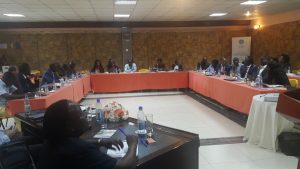 May 22, Kampala – The Government of Uganda through the Global Green Growth Institute, received funding of EUR 908,000 from the Government of the Kingdom of the Netherlands to support the Solar Home Systems (SHS) market penetration project in Gulu and Mbarara over 26 months. The project will conduct a market assessment, end consumer assessment, gender analysis and geo-spatial analysis to determine the market demand and supply, barriers to uptake of SHS and eventually design and implement an appropriate solution to improve access to SHS in low-income, urban households in the two cities.
May 22, Kampala – The Government of Uganda through the Global Green Growth Institute, received funding of EUR 908,000 from the Government of the Kingdom of the Netherlands to support the Solar Home Systems (SHS) market penetration project in Gulu and Mbarara over 26 months. The project will conduct a market assessment, end consumer assessment, gender analysis and geo-spatial analysis to determine the market demand and supply, barriers to uptake of SHS and eventually design and implement an appropriate solution to improve access to SHS in low-income, urban households in the two cities.
The project launch was performed by H.E. Henk Jan Bakker, the Ambassador of the Kingdom of the Netherlands to Uganda and the Okubal Peter James Ejokuo, Country Director GGGI Uganda office on May 22 at Hotel Africana in Kampala. A total of 35 participants attended from the Netherlands embassy, district representatives from two secondary cities and solar industry private sector.
This initiative is part of the long-term support that GGGI will be offering to the Government in its efforts in transitioning to a green economy as outlined in the Vision 2030, NDPII, UGGDS, NDCs and SDGs. GGGI’s support over the next 5 years will focus on Sustainable Energy Access Off-grid and Energy Efficiency and Green Cities development which were found to have greater green growth multiplier effects. These will be complemented by support to the Water and Sanitation and Environment.
GGGI will collaborate in this strategic partnership between the Economic Policy Research Centre (EPRC) and Geo-Gecko limited to apply the expertise of these three organizations to come up with an innovative solution, which is expected to go a long way to catalyze the SHS market in Uganda and specifically the two Secondary cities. The cities have been prioritized cities under the National Development Plan II (NDP II) and are complementary to Kampala national metropolitan area which will be the country’s most competitive area, focusing primarily high value-added services sector activity in the central Kampala region, with some industrial and manufacturing sector activity. Therefore, as envisioned above, Mbarara and Gulu Secondary cities will play a crucial role in the urbanization and socio-economic transformation of Uganda towards middle income status.
Speaking at the launch, the Ambassador of the Netherlands Embassy, H.E. Henk Jan Bakker said that this is a major achievement between the Government, development partners, and the private sector. He said that access to energy is an important driver for economic growth and by conducting a comprehensive solar market, gender spatial analysis, covering both the demand side as well as the supply side issues, partner in the project will be able to identify and facilitate tailor made solutions to existing energy access constraints. He also provided his views on how the Government could create an enabling environment to achieve universal access to energy such as setting up a clear off-grid policy, support or incentivize the private sector and lastly, clarify of the taxation policy engaged in the off-grid technologies
The implementation of this project will set off a process that will seek to unlock the potential of productive economic activities in these two secondary cities, that is currently curtailed by inhibitive access to clean energy and to explore how SHS can contribute to closing that gap; the electrification of households in the secondary cities and the design of innovative financing schemes to enable connectivity , will also offer opportunities for micro and small businesses to contribute to inclusive growth, employment and the development of local markets.